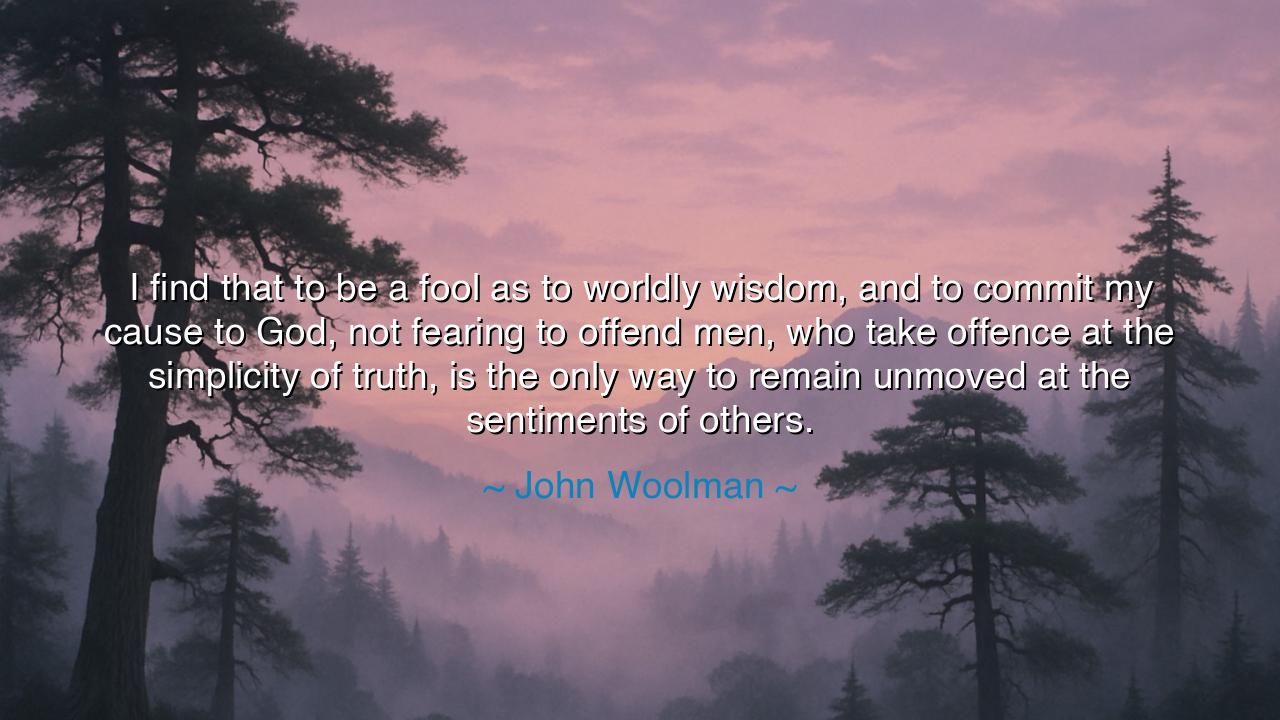
I find that to be a fool as to worldly wisdom, and to commit my
I find that to be a fool as to worldly wisdom, and to commit my cause to God, not fearing to offend men, who take offence at the simplicity of truth, is the only way to remain unmoved at the sentiments of others.






John Woolman, the gentle Quaker and prophet of conscience, speaks with the voice of one who has walked in humility before God: “I find that to be a fool as to worldly wisdom, and to commit my cause to God, not fearing to offend men, who take offence at the simplicity of truth, is the only way to remain unmoved at the sentiments of others.” In these words lies the heart of his life’s testimony—that true strength is found not in the cleverness of men, but in the simplicity of truth, entrusted to the eternal will of God.
The meaning is deep and radiant. To the world, a man who refuses wealth, power, or compromise appears a fool. But Woolman declares that this is the only way to remain steadfast, for the wisdom of men is ever shifting, bound to fashion and opinion. The wisdom of God, however, is eternal, and to rest upon it is to stand like a tree rooted by living waters. Those who take offence at this simplicity reveal their own pride, for truth, unadorned, offends those who thrive on deception and flattery.
History bears witness in Woolman’s own life. In an age when slavery was accepted as ordinary commerce, he refused to write legal documents that supported the buying and selling of human beings. Many considered him impractical, a fool who disrupted business with his stubborn scruples. Yet by following the simplicity of truth, he became one of the earliest and most persuasive voices against slavery in America. His quiet, unwavering conscience prepared the ground for the greater abolitionist struggles that would follow.
This teaching reminds us of the eternal struggle between worldly wisdom and divine truth. Worldly wisdom seeks advantage, reputation, and compromise; divine truth seeks justice, mercy, and love, even when the world sneers. To be faithful often means to be mocked, to be rejected, even to be scorned as a fool. But it is better, Woolman teaches, to be counted a fool before men than to betray the eternal law written in the heart.
Therefore, let the seeker of wisdom not fear the reproach of others. Offence will always be taken by those who hate truth’s simplicity, but their voices are fleeting. The soul anchored in God, unmoved by praise or scorn, shines brighter than all the cleverness of men. Woolman’s words stand as a clarion call: embrace the simplicity of truth, commit your cause to the Eternal, and you shall not be shaken by the winds of human opinion.






LLinh
As a reader, I find this statement both inspiring and unsettling. It invites a kind of courage that feels rare today—the willingness to appear foolish for the sake of truth. Yet, it also raises a practical concern: how can one live ethically in a world governed by social norms without rejecting those norms entirely? Woolman’s faith-based independence sounds liberating, but it also seems lonely, especially in a society driven by approval and conformity.
HPHuy Phong
There’s something deeply peaceful yet defiant in this perspective. It suggests that confidence in divine guidance can free a person from the tyranny of public opinion. But I can’t help wondering—how does one maintain humility while also claiming divine assurance? Isn’t there a risk of mistaking personal conviction for divine truth? Woolman’s words challenge me to consider where faith ends and self-righteousness begins in our moral decisions.
MAMinh anh
This reflection feels profoundly spiritual yet countercultural. It makes me think about how truth often offends those invested in comfort or conformity. But I struggle with the idea of being a ‘fool to worldly wisdom.’ Isn’t worldly wisdom sometimes necessary for survival and justice? Perhaps Woolman meant that spiritual clarity transcends worldly calculation—but I wonder, how do we discern when simplicity is truth and when it becomes naivety?
BVBTS Vo
I find Woolman’s sentiment admirable, yet incredibly difficult to live by. He seems to equate humility before God with freedom from social judgment. But isn’t there also wisdom in understanding how others perceive us? Can faith and social sensitivity coexist, or does one inevitably compromise the other? I’m curious how Woolman balanced moral courage with compassion for those who disagreed with him—especially in times when dissent carried real personal risk.
HDHuynh Do
This quote really speaks to the tension between faith and worldly acceptance. It seems Woolman believed that true integrity requires rejecting the values of social approval. But I wonder, can someone genuinely live without caring about others’ opinions in today’s interconnected world? Is it still possible to follow moral conviction over public perception without becoming isolated or misunderstood? His words feel both empowering and painfully idealistic in a modern context.